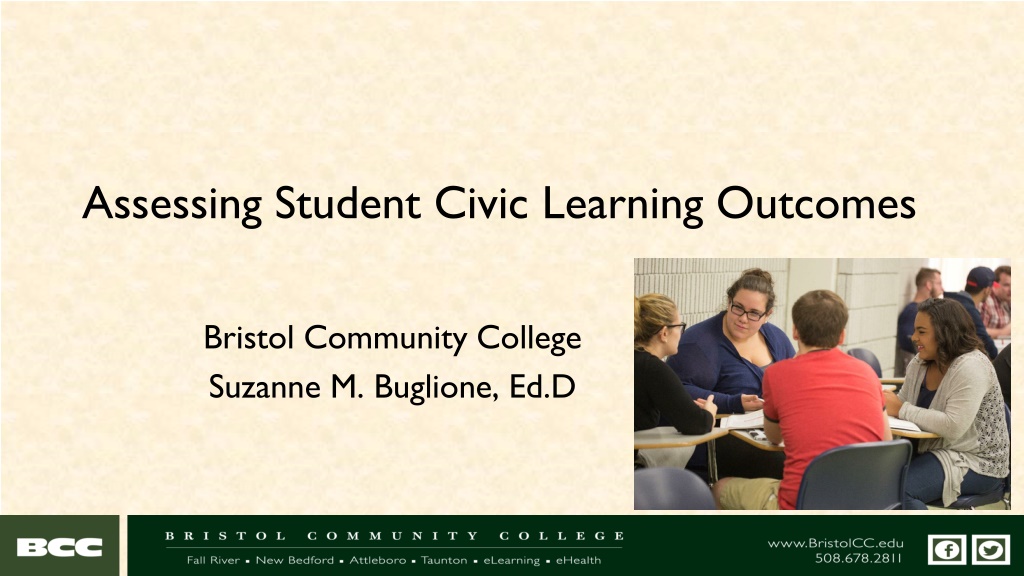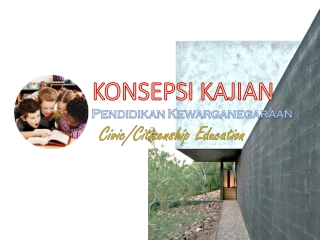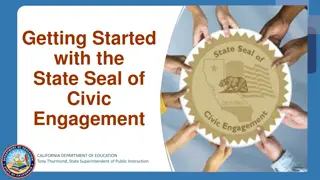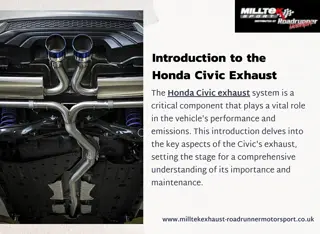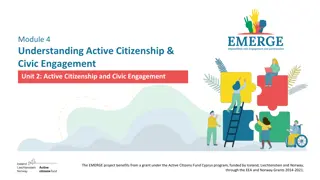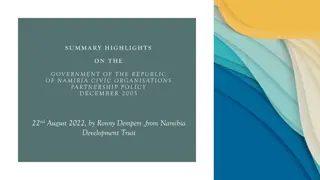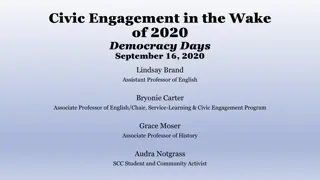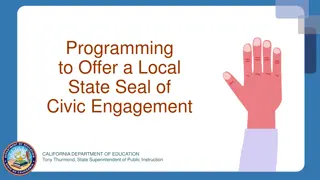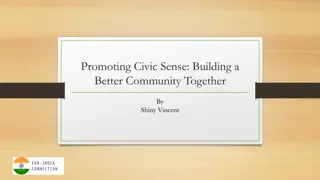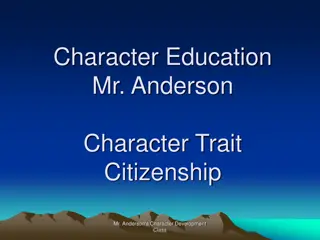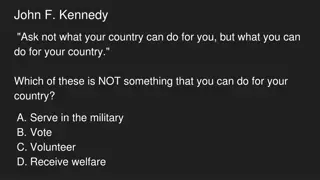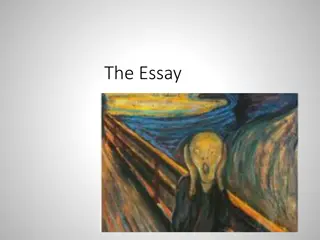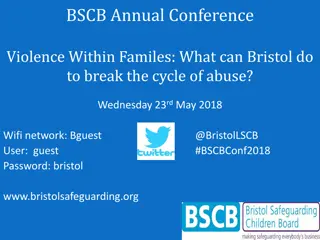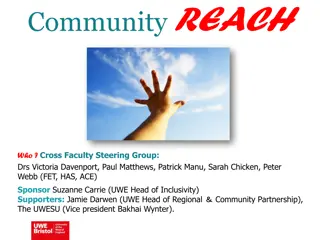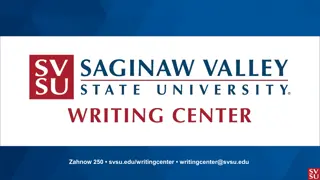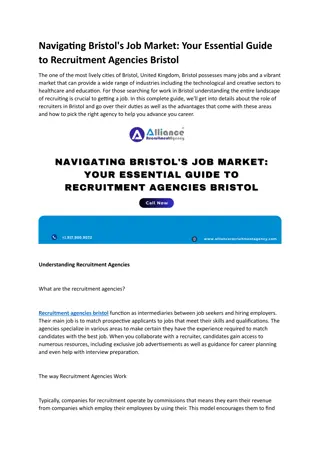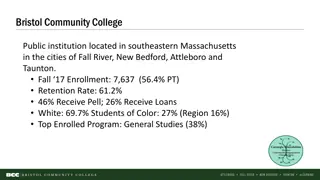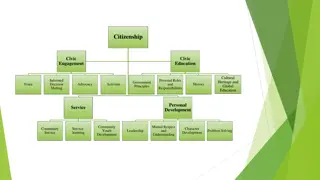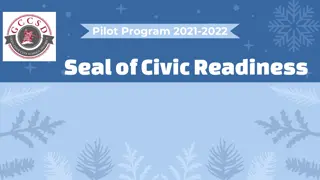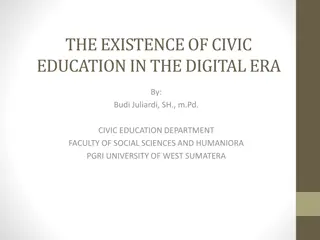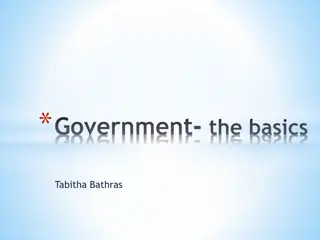Evaluating Civic Learning Outcomes at Bristol Community College
Assessing civic learning outcomes at Bristol Community College involves course-level assessments based on student learning outcomes (SLOs) through quantitative data collection, impact data collection using pre and post surveys, and evaluation of volunteerism/civic engagement effects. Various methods such as reflective assessments, group discussions, and one-minute papers are employed to enhance educational effectiveness and student engagement. The data shows positive changes in students' attitudes towards community impact and career aspirations, reflecting the success of service-learning courses and the institution's focus on civic engagement.
Download Presentation

Please find below an Image/Link to download the presentation.
The content on the website is provided AS IS for your information and personal use only. It may not be sold, licensed, or shared on other websites without obtaining consent from the author. Download presentation by click this link. If you encounter any issues during the download, it is possible that the publisher has removed the file from their server.
E N D
Presentation Transcript
Assessing Student Civic Learning Outcomes Bristol Community College Suzanne M. Buglione, Ed.D
Assessment Course-level by faculty based on SLOs Quantitative Data Collection courses, students, faculty, persistence, retention Impact Data Collection pre and post surveys
Assessment Course-level by faculty based on SLOs Educational Effectiveness SLO subcommittee review Course design based on SLOs Course assessments based on SLOs At least one reflective assessment promote more, brief assessments at intervals Discussion boards Group discussions & Report backs One-Minute papers
Assessment Quantitative Data Collection Courses flagged by Registrar Data pulls: # students, # faculty Persistence (84% as compared to 71%) calculated from one semester to another Retention calculated from Fall-to-Fall
All Service-Learning Courses Fall 2015 Spring 2016 25 Sections 6 CLER 21 Faculty 6 CLER 362 Students 86 CLER 22 Sections 5 CLER 18 Faculty 5 CLER 303 Students 58 CLER
Assessment Impact Data Collection pre and post surveys Diaz-Gallegos, D., Furco, A., & Yamada, H. (1990). Higher education service learning surveys. Retrieved from http://www.servicelearning.org/filemanager/down- load/HEdSurveyRel.pdf. Two intervals in the semester paper or electronic Limitations in response rate Measures Academic, Career, Personal, Volunteerism/Civic Engagement
Assessment Volunteerism/Civic Engagement Pre Positive Post Positive % CHG I feel that I can have a positive impact on local social problems. 75.38% 84.61% 12.24% 60% 70.76% 17.94% I plan to improve my neighborhood in the near future. Career Pre Positive Post Positive % CHG I have definite career plans. It is important to find a career that directly benefits others. 73.84% 80% 83.07% 92.30% 12.5% 15.38% Personal Pre Positive 78.46% Post Positive 92.30% % CHG 17.64% What happens to me is my own doing. I feel that I have little control over the things that happen to me. 83.07% 61.53% -25.92% The extent of my achievement is often determined by chance. 66.16% 58.46% -11.62%
Assessment 28% of CLER students responded Focus on changes 10%+ Do you plan to continue your service with this agency? Do you intend to continue to serve your community in the future? Did your participation in the service component enhance your understanding of the course material? 70% yes I expected to have a positive experience with my Service- Learning. Did the service- learning component of this course meet your expectations? 61% Yes 83% yes 91% yes 83% yes 8
Civic Learning Student Comments I think it was good to volunteer and every class should have this Hands on experience helped me learn more about my community I didn't expect to get as much out of it as I did. I was very pleased with my service learning component, I met great people and discovered the true meaning of giving my free time to others in need. It linked the issues of poverty that are dealt with today back to the same struggles the poor dealt with during the civil war. It was very fulfilling. it gave me a purpose in the community and made me feel important. I learned a lot in all of my service learning projects. Because i now i have a better understanding about my town and makes me want to experience some more new things. 9
Civic Learning Student Comments Helping others impacts the world and makes you a part of something bigger than yourself. I don't think anything could have helped me understand the United States Government more than working with the Charter Review board and of course having a teacher that is so involved in every aspect of Government helped tremendously! It should be there's a lot of people who are uneducated about the serious things going on in our country It made me realize what is most important in my life and how to get involved in helping others in need. Because I learned about things that I used to see every day but did not realize how important it is. 10
Assessment Data sharing: Faculty Forum College Administration Program Development Thank you!
